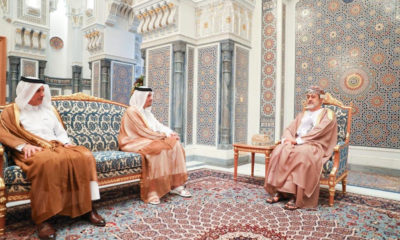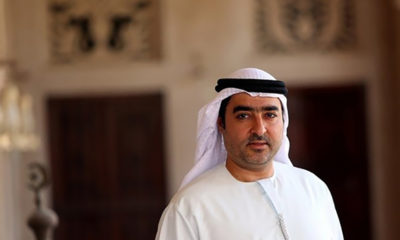
OpEds

Profits of peace: The Abraham Accords two years on
Published
2 years agoon
By
Steven GruzdTwo years after The Abraham Accords were inked on the White House South Lawn on 15 September 2020, have they heralded the “warm peace” touted at the time?
In 2020, leaders from the United Arab Emirates (UAE), Bahrain, Israel, and the United States inked the documents through which the two Arab countries formally recognised the state of Israel. The Abraham Accords – named after the shared monotheistic patriarch of the Jewish, Christian, and Muslim faiths –were the first peace agreements with an Arab state that Israel had signed since the treaty with Jordan in 1994. Similar diplomatic deals with Morocco and Sudan followed by the end of 2020, in the dying days of Donald Trump’s presidency, and they were added to The Abraham Accords.
Since 2020, travel by Israelis to the UAE has mushroomed to more than 450 000 trips in spite of COVID-19 lockdowns. In April 2021, Emirates Airlines launched the first direct flights between Dubai and Ben Gurion Airport.
Far fewer Emiratis have visited Israel, though. Middle East commentator Rolene Marks told the SA Jewish Report, “For Israelis, we’ve long heard about Dubai and all the opportunities there, and we’re curious. There’s the Burj Khalifa [the world’s tallest building, in Dubai] and the shopping. We’ve seen Emirati delegations coming out, but not as much as we would like to. We’re seeing the peace through social media, through all the co-operation, the memorandums of agreement and understanding that are signed, and the amount of business that’s being done with the Emirates, which is staggering. But tourism could definitely do with a boost, and maybe Israel isn’t promoted there as much as the Emirates are here.”
Business relations between Israel and the UAE are, indeed, booming. The two countries have increased co-operation in the diamond trade, artificial intelligence, and defence, among others. New investments have arisen by law firms, healthcare providers, and Israeli water quality testing companies. Kosher restaurants have opened in the UAE, and the country has begun investing in Israeli assets such as Israir Airlines, Haifa Port Company, and the Beitar Jerusalem football team. Defence exports alone of about $800 million (R14 billion) were made to Abraham Accords countries in 2020. Bilateral trade is expected to top $10 billion (R175.8 billion) by 2027.
Israelis have begun moving to Dubai, feeling safe and welcome there. The UAE has appointed its first chief rabbi, Levi Duchman, who plans to welcome thousands of Jews from all around the world in the next decade.
Groups like Tel Aviv International Salon, Sharaka, and OurCrowd have focused on deepening ties with Gulf states. The UAE, Bahrain, Morocco, and Saudi Arabia participated in a commemoration of International Holocaust Memorial Day in March 2021. That month, the first ever Israel-UAE rugby match was played.
Khalifa, an Emirati on Twitter (@AD_GQ) said to the SA Jewish Report, “There are many successes. Trade is open and increasing. There’s a catching up between the children of Abraham … joint projects in various fields, cultural exchanges. This was a closed door, and suddenly it opened, ushering a new era of peace with two out of the six Arabian Gulf countries. I say the learning about each other has begun and we have so much to learn about each other. The few [Emiratis] who have visited [Israel] that I know told me that it’s worth the trip, but always have a guide.”
What of the other three countries? Relations with Bahrain had also existed below the radar for several years. Bahrain, the UAE, and Israel agreed jointly to oppose the revival of the nuclear deal with Iran and Tehran’s ballistic missile programme.
Morocco’s effort to preserve its Jewish history – with about 2 500 Jews still living there – has formed the basis of low-key relations with Israel for many years. Controversially, the US under Donald Trump recognised Morocco’s claims to the Western Sahara as a sweetener to induce better ties with Israel.
Political instability in Sudan has meant little progress on relations between Khartoum and Jerusalem.
Trump promised that many more countries would follow in establishing relations with Israel, but this hasn’t yet materialised after Sudan and Morocco. The deal-making lost steam with Trump’s defeat and the departure from government of his son-in-law, Jared Kushner. The proposed Abraham Fund, supposed to raise $3 billion (R52.7 billion), collapsed.
The Abraham Accords, a Trump legacy, have survived and thrived. The Biden Administration, however, prefers the term “normalisation agreements”.
In more signs of a warm peace, Israel President Isaac Herzog undertook a ground breaking state visit to the UAE in January 2022. The Negev Summit in Sde Boker in March 2022 brought together the foreign ministers of Israel, Egypt, Morocco, Bahrain, the UAE, and US – an impossible dream before the Accords. UAE Foreign Minister Abdullah bin Zayed visited Israel for the two-year anniversary, laying a wreath at the Yad Vashem Holocaust Memorial and meeting the president and prime minister.
The big prize for Israel would be ties with Saudi Arabia. Without Riyadh’s green light, The Abraham Accords would never have been signed. In a positive sign, aircraft to and from Israel have been permitted to use Saudi airspace, beginning with Biden’s trip on Airforce One in July 2022.
Middle East expert Larry Benjamin at the University of the Witwatersrand told the SA Jewish Report, “I can say that the Israeli population has been way more enthusiastic than its Bahraini and UAE counterparts, but that aside, trade volumes have grown exponentially especially between Israel and the UAE. So, if that’s the variable by which success is measured, then the Accords have been highly beneficial to all parties.”
Sadly, one country that hasn’t welcomed the rapprochement has been South Africa, which downplayed and naysaid the ties in 2020, viewing the accords as a betrayal of the Palestinians. The progress of the past two years shows how out of touch the South African government is with the new spirit in the Middle East. You snooze, you lose!
- Steven Gruzd is a political analyst at the South African Institute of International Affairs in Johannesburg. He writes in his personal capacity.










